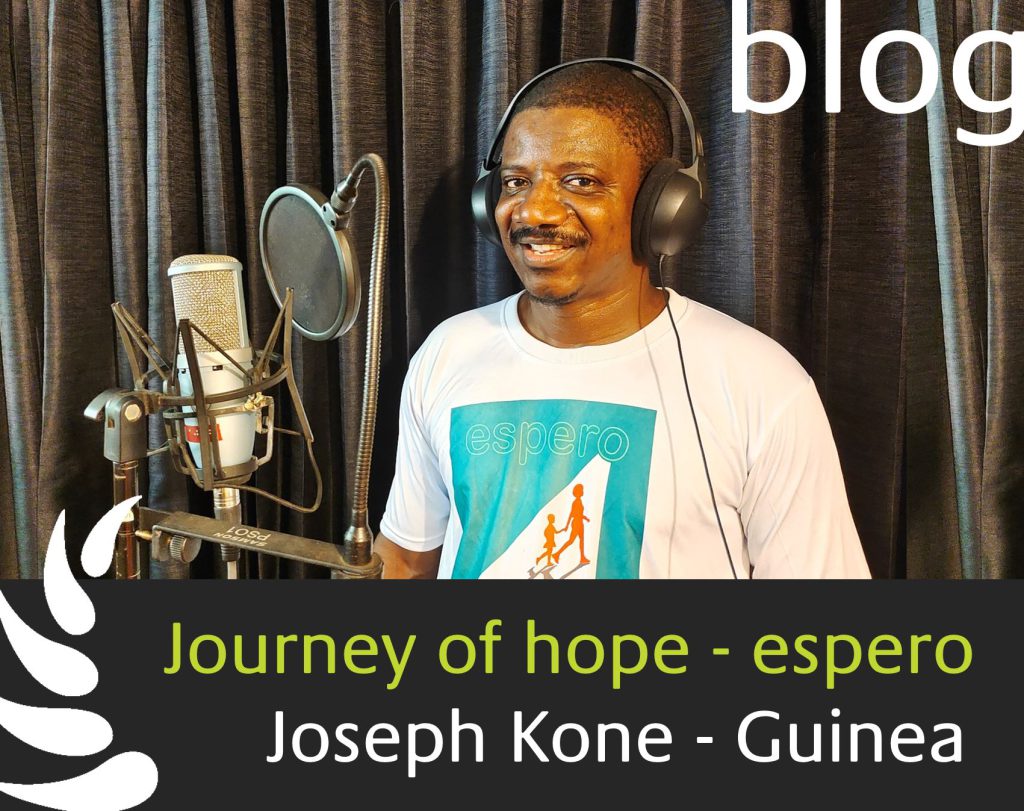Joseph Christophe Kone is originally from Liberia, West Africa. At age seven, Joseph witnessed rebels capture the city of Gbarnga in Liberia. His mother fled together with him and his sister to a village, where he was forced to watch how the rebels committed atrocities against women. The little family sought refuge in a nearby cave until a ceasefire was reached. When life slowly returned to normal, he discovered a passion for radio. This was the beginning of his radio broadcasting journey, a journey to fight injustice against women, a journey of hope, espero.
I was seven years old when the town of Gbarnga in Liberia fell into the hands of the United Liberation Movement of Liberia for Democracy (ULIMO) rebels. That morning, we heard gunshots; everyone began running in all directions. My mother was able to carry my sister and me to our village, where we slept for a night. The next day afternoon, we heard gunshots again, this time much closer; and again, there was panic, and we started running. But the rebels had now surrounded the village. We all sought refuge in our houses. We were dragged to the village square one by one. The children, elderly women, and men were made to sit on the ground in a circle. The rebels then forced us to watch them brutally rape young women, many of them our closest relatives.
When the rebels left, they were leaving behind a deeply traumatized community. Not much later, the village was protected by another rebel group, but trust was gone. We feared that the brutal ULIMO rebels would return, so our mothers took us away from the village, taking refuge in a cave. We children, alongside the elderly, were left in the cave while our mothers and sisters went out in search of food. It was from this moment that I knew that women are strong and resilient.
When a ceasefire was announced and there was a return to normalcy, we went back to town and I enrolled in school. The ceasefire however was unstable, and from time to time, we found ourselves on the run again.
After the civil strife, the country slowly returned to normal. During one Christmas vacation, the youth of our village organized a football tournament. On Christmas Day, we were having a friendly football match with our neighboring village. The wireless microphone used for announcements caught my eye. On an impulse, I picked it up and started commentating on the match. The crowd began to cheer. Afterward, many stopped by to encourage me, saying it reminded them of professional radio reporters, and some even gave me money. There was this old man, Garkpon, who never called me by my name again. Since that day, he always referred to me as: “my journalist”. That day, I felt useful, and I knew I had a place in society.
From childhood onwards, I have observed a contradiction in our society. Women are the survivors, the strong backbones of our communities, and yet they are the ones who suffer oppression.
Above all, my greatest admiration goes to my mother and sister under whose guidance I grew up. Had it not been for them, I would have become a rebel or even been killed. The strength in them made me stand for the women. I was intrinsically driven to join the campaign to overcome the poverty and injustice women faced. And my contribution was to be through the medium I knew best: radio.
I started a radio station in Liberia, which achieved local popularity through its programs which included topics like women’s rights. But I was cheated by my partner (our district representative in the national legislature). He took over the station as chairman of the board of trustees. He suspended me indefinitely for some vague “administrative” reasons. Later, I realized that he saw me as a hindrance to his political position because of my popularity.
Out of frustration, I decided to leave Liberia and take the long and dangerous journey to Europe through Guinea. In Guinea, I met another strong woman who ignited the fire inside me to stand up for women and not give up my motive. Whether it is Liberia or Guinea, women suffer everywhere. I want to live in a community where women will not be forced into early marriage, sexual exploitation, or suffer physical abuse; but where their capabilities are built, and aspirations are cultivated; a community where everyone should be empowered to go their path. And Radio will be my tool.
Joseph will share his story and idea for social change with the public during kanthari TALKS. Save the dates: 17th and 18th December 2021
More details about this event that will be live-streamed can be found on http://www.kantharitalks.org/



